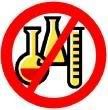The average U.S. home harbors about 62 toxic chemicals linked to allergies, birth defects and cancer. While not all chemicals are bad for you, it's easy to find non-toxic alternatives. The average American uses about 25 gallons of toxic products per year in their home (Source: Prosperity Without Pollution, by Joel S. Hirschorn and Kirsten V. Oldenburg, 1991).
"There are many, many things that you can do that will take literally two minutes or less, things you do every day anyway. Why not just try to do them a little differently? Some things take no extra time, things like using laundry soap instead of laundry detergent. It takes the same amount of time to do your laundry. It takes the same amount of time to do your shopping but it makes a difference [to the environment]." - Marjorie Lamb
EPA studies of human exposure to air pollutants indicate that indoor air levels of many pollutants may be 2-5 times, and occasionally, more than 200 times higher than outdoor levels. Cleaning products and other household products are among the many culprits. (Source: EPA)
Cleaning products can be among the most hazardous chemicals in your home or office and are therefore regulated by the Consumer Product Safety Commission. These products create hazardous waste -- threatening human health and the natural environment. Borax, ammonia and baking soda are safe alternatives that can clean and disinfect to meet hospital standards and are much cheaper than name brand cleaners.
There are many green products available that are just as effective as traditional ones. Contact this blogger if you need information on where to shop.
Tips:
• Choose products that are biodegradable and non toxic to humans and aquatic life.
• Choose concentrated products, and be sure that they can work in cold water.
• Choose products with VOC concentrations of less than 10% of the weight of the products when diluted for use as directed.
• Choose products with a neutral pH.
• Choose products in recycled, recyclable and refillable containers and packaging.
• Avoid petroleum-derived ingredients. Instead choose surfactants derived from vegetable oil. Look for d-limonene and pine oil solvents.
• Avoid containing EDTA and NTA. Look for alternatives with sodium citrate, sodium bicarbonate, sodium carbonate, and sodium silicate.
• Avoid phosphates -- choose products with a phosphate concentration of 0.5% or less by weight.
• Avoid products containing chlorine bleach or sodium hypochlorite.
Did you know that... Electric dryers account for 5 to 10% of residential energy consumption. And, using cold water will save close to 85% of the energy and dollars you use on washing.

Wednesday, May 21, 2008
Subscribe to:
Post Comments (Atom)

No comments:
Post a Comment